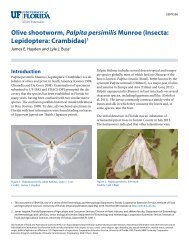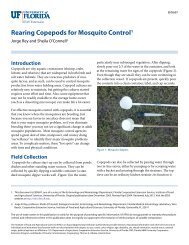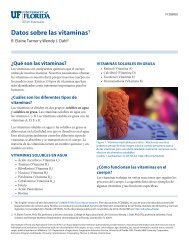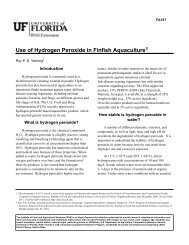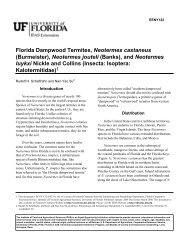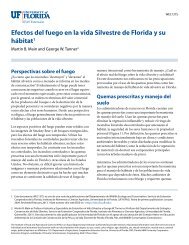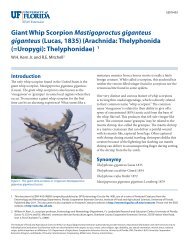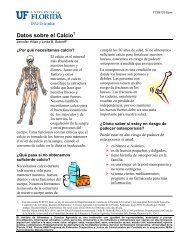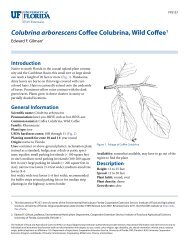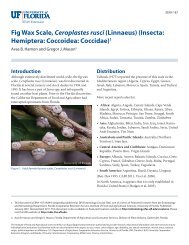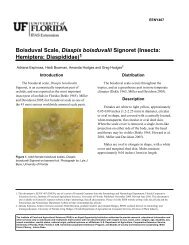Building Teamwork and the Importance of Trust in a Business - EDIS ...
Building Teamwork and the Importance of Trust in a Business - EDIS ...
Building Teamwork and the Importance of Trust in a Business - EDIS ...
You also want an ePaper? Increase the reach of your titles
YUMPU automatically turns print PDFs into web optimized ePapers that Google loves.
<strong>Build<strong>in</strong>g</strong> <strong>Teamwork</strong> <strong>and</strong> <strong>the</strong> <strong>Importance</strong> <strong>of</strong> <strong>Trust</strong> <strong>in</strong> a<br />
Bus<strong>in</strong>ess Environment 1<br />
Clayton Becton, Allen Wysocki, <strong>and</strong> Karl Kepner 2<br />
Introduction<br />
<strong>Trust</strong> is a big issue <strong>in</strong> today’s bus<strong>in</strong>ess world, s<strong>in</strong>ce evidence<br />
suggests that trust between associates (employees) <strong>and</strong><br />
employers has been wan<strong>in</strong>g. It is difficult, if not impossible,<br />
to have effective <strong>and</strong> productive work<strong>in</strong>g relationships<br />
without trust (Castro, 1994). Therefore, trust is critical for<br />
every bus<strong>in</strong>ess.<br />
In <strong>the</strong> past, companies used teams only for special projects.<br />
Today, associates <strong>of</strong>ten work <strong>in</strong> teams on a daily basis.<br />
<strong>Teamwork</strong> <strong>in</strong>volves trust among team members <strong>and</strong><br />
between management <strong>and</strong> associates.<br />
This article will discuss what trust is <strong>and</strong> why it is critical<br />
<strong>in</strong> bus<strong>in</strong>ess, why bus<strong>in</strong>esses need teamwork to survive, <strong>and</strong><br />
tips for team build<strong>in</strong>g.<br />
What <strong>Trust</strong> Is <strong>and</strong> Why It Is Critical<br />
<strong>in</strong> Bus<strong>in</strong>ess<br />
Webster’s Dictionary def<strong>in</strong>es trust as <strong>the</strong> “assured reliance<br />
on <strong>the</strong> character, ability, strength, or truth <strong>of</strong> someone or<br />
someth<strong>in</strong>g.” Many managers believe that one <strong>of</strong> <strong>the</strong> ma<strong>in</strong><br />
keys to <strong>the</strong> survival <strong>of</strong> a bus<strong>in</strong>ess is trust. <strong>Trust</strong> is a critical<br />
issue <strong>in</strong> any type <strong>of</strong> relationship because a relationship<br />
without trust is not really a relationship at all. One <strong>of</strong> <strong>the</strong><br />
problems that managers encounter when deal<strong>in</strong>g with<br />
teams is that managers cannot automatically <strong>in</strong>still trust<br />
1. This document is [PUBNUMBER], one <strong>of</strong> a series <strong>of</strong> <strong>the</strong> Food <strong>and</strong> Resource Economics Department, Florida Cooperative Extension Service, Institute <strong>of</strong><br />
Food <strong>and</strong> Agricultural Sciences, University <strong>of</strong> Florida. Orig<strong>in</strong>al publication date June 2002. Revised October 2008. Reviewed February 2012. Visit <strong>the</strong><br />
<strong>EDIS</strong> website at http://edis.ifas.ufl.edu.<br />
2. Clayton Becton, graduate student; Allen Wysocki, Assistant Pr<strong>of</strong>essor; <strong>and</strong> Karl Kepner, Dist<strong>in</strong>guished Pr<strong>of</strong>essor; Department <strong>of</strong> Food <strong>and</strong> Resource<br />
Economics, Florida Cooperative Extension Service, Institute <strong>of</strong> Food <strong>and</strong> Agricultural Sciences, University <strong>of</strong> Florida, Ga<strong>in</strong>esville, FL 32611.<br />
The Institute <strong>of</strong> Food <strong>and</strong> Agricultural Sciences (IFAS) is an Equal Opportunity Institution authorized to provide research, educational <strong>in</strong>formation <strong>and</strong> o<strong>the</strong>r services only to<br />
<strong>in</strong>dividuals <strong>and</strong> <strong>in</strong>stitutions that function with non-discrim<strong>in</strong>ation with respect to race, creed, color, religion, age, disability, sex, sexual orientation, marital status, national<br />
orig<strong>in</strong>, political op<strong>in</strong>ions or affiliations. U.S. Department <strong>of</strong> Agriculture, Cooperative Extension Service, University <strong>of</strong> Florida, IFAS, Florida A&M University Cooperative<br />
Extension Program, <strong>and</strong> Boards <strong>of</strong> County Commissioners Cooperat<strong>in</strong>g. Millie Ferrer-Chancy, Interim Dean<br />
HR018<br />
<strong>in</strong>to <strong>the</strong>ir associates. Even with <strong>the</strong> appropriate <strong>in</strong>dividuals<br />
on a team, a team that does not build a trust<strong>in</strong>g relationship<br />
is not an effective team. Research shows that trust is <strong>the</strong><br />
basis for creat<strong>in</strong>g a healthy work environment. Accord<strong>in</strong>g<br />
to Heathfield (2002a), trust is <strong>the</strong> necessary precursor for<br />
<strong>the</strong> follow<strong>in</strong>g:<br />
• Feel<strong>in</strong>g able to rely upon ano<strong>the</strong>r person;<br />
• Cooperat<strong>in</strong>g as a group;<br />
• Tak<strong>in</strong>g thoughtful risks;<br />
• Experienc<strong>in</strong>g believable communication.<br />
In o<strong>the</strong>r words, “trust forms <strong>the</strong> foundation for effective<br />
communication, associate retention, motivation, <strong>and</strong><br />
contributions <strong>of</strong> discretionary energy” (Heathfield, 2002a).<br />
Bus<strong>in</strong>ess Needs <strong>Teamwork</strong> to<br />
Survive<br />
Many have heard <strong>the</strong> statement that <strong>the</strong>re is “no ‘I’ <strong>in</strong> <strong>the</strong><br />
word ‘Team’.” This is as true today as it has ever been. Bus<strong>in</strong>esses<br />
have found that <strong>the</strong> key to successfully complet<strong>in</strong>g<br />
<strong>and</strong> accomplish<strong>in</strong>g projects is <strong>of</strong>ten through <strong>the</strong> development<br />
<strong>of</strong> teams. Whereas <strong>in</strong> <strong>the</strong> past, teamwork was used<br />
only for special projects, now it is <strong>of</strong>ten <strong>the</strong> norm (Castro,
1994). <strong>Teamwork</strong> has become an essential element for <strong>the</strong><br />
success <strong>and</strong> survival <strong>of</strong> a bus<strong>in</strong>ess.<br />
True collaboration, however, is a problem that plagues<br />
companies when try<strong>in</strong>g to develop a teamwork environment.<br />
It becomes a problem because, <strong>in</strong> <strong>the</strong> “real” world,<br />
<strong>in</strong>dividuality is rewarded more <strong>of</strong>ten than team participation.<br />
Managers must be able to develop ways for associates<br />
to grow <strong>and</strong> develop as a team. Team build<strong>in</strong>g is not always<br />
<strong>the</strong> easiest task to accomplish, but with <strong>the</strong> five tips listed <strong>in</strong><br />
this paper, effective teams can be built.<br />
Tips for Team <strong>Build<strong>in</strong>g</strong><br />
John Castro (1994), CEO <strong>and</strong> President for Merrill Corporation,<br />
likens trust <strong>and</strong> teamwork to gett<strong>in</strong>g on a tra<strong>in</strong>:<br />
once on board, everyone who wants a seat should get one.<br />
Management is responsible for build<strong>in</strong>g trust <strong>and</strong> f<strong>in</strong>d<strong>in</strong>g<br />
associates who want to participate as a successful team<br />
(Castro, 1994).<br />
There are many ways that management can create <strong>and</strong><br />
manage successful teams. Heathfield (2002b) <strong>of</strong>fers five<br />
helpful tips on how this can be accomplished.<br />
Tip 1: Form teams to solve real work issues<br />
<strong>and</strong> improve real work processes<br />
The manager should provide <strong>the</strong> team with teamwork<br />
tra<strong>in</strong><strong>in</strong>g beforeh<strong>and</strong> on systematic methods <strong>of</strong> team work.<br />
The team should focus on accomplish<strong>in</strong>g <strong>the</strong> project, not on<br />
how to work toge<strong>the</strong>r as a team.<br />
Tip 2: Hold departmental meet<strong>in</strong>gs to<br />
review projects <strong>and</strong> progress<br />
It is <strong>the</strong> manager’s responsibility to recognize when a group<br />
is not develop<strong>in</strong>g a healthy relationship. Departmental<br />
meet<strong>in</strong>gs give <strong>the</strong> manager <strong>the</strong> opportunity to exam<strong>in</strong>e <strong>the</strong><br />
team’s progress. If a team is fall<strong>in</strong>g beh<strong>in</strong>d, <strong>the</strong> manager<br />
should look to see if <strong>the</strong> team has personality issues or<br />
difficulties <strong>in</strong> agree<strong>in</strong>g on <strong>the</strong> best approach for <strong>the</strong><br />
assignment.<br />
Tip 3: Build fun <strong>and</strong> shared experiences<br />
<strong>in</strong>to <strong>the</strong> organization’s agenda<br />
The manager should help <strong>the</strong> team th<strong>in</strong>k as a unit with<strong>in</strong> a<br />
fun work environment so that everyone on <strong>the</strong> team feels<br />
<strong>in</strong>volved <strong>and</strong> appreciated. For example, management could<br />
sponsor company d<strong>in</strong>ners or bus<strong>in</strong>ess trips to sport<strong>in</strong>g<br />
events or team retreats.<br />
Tip 4: Use icebreakers <strong>and</strong> time-limited<br />
fun team-build<strong>in</strong>g exercises<br />
The manager should use icebreakers <strong>and</strong> group activities<br />
at <strong>the</strong> beg<strong>in</strong>n<strong>in</strong>g <strong>of</strong> meet<strong>in</strong>gs to promote <strong>in</strong>teraction <strong>and</strong><br />
camaraderie among team members. The bottom l<strong>in</strong>e is that<br />
icebreakers help associates to get to know each o<strong>the</strong>r on a<br />
more personal basis.<br />
Tip 5: Celebrate group successes publicly<br />
The manager should recognize <strong>the</strong> group as a whole for<br />
<strong>the</strong>ir accomplishments, not just <strong>in</strong>dividuals with<strong>in</strong> <strong>the</strong><br />
group. Constructive group praise is always <strong>the</strong> best policy.<br />
Conclusion<br />
Castro (1994) describes <strong>the</strong> process <strong>of</strong> trust, teamwork, <strong>and</strong><br />
change as a journey. And although managers cannot force<br />
<strong>the</strong>ir associates to trust each o<strong>the</strong>r or to work as a team,<br />
<strong>the</strong>y can provide associates with <strong>the</strong> needed resources to<br />
build trust. Once trust is established, managers have an<br />
better opportunity to accomplish <strong>the</strong> company’s goals.<br />
References<br />
Castro, John. (1994). <strong>Trust</strong>, teamwork, <strong>and</strong> bus<strong>in</strong>ess <strong>in</strong><br />
<strong>the</strong> 90s. Available on <strong>the</strong> World Wide Web at http://www.<br />
cebcglobal.org/<strong>in</strong>dex.php?/ceos-corner/comments/trustteamwork-<strong>and</strong>-bus<strong>in</strong>ess-<strong>in</strong>-<strong>the</strong>-90s.<br />
Date visited: 3/18/02.<br />
Heathfield, Susan M. (2002a). <strong>Trust</strong> rules! The most<br />
important secret. Available on <strong>the</strong> World Wide Web at<br />
http://humanresources.about.com/od/workrelationships/a/<br />
trust_rules.htm. Date visited: visited 3/18/02.<br />
Heathfield, Susan M. (2002b). How to build a teamwork<br />
culture: Do <strong>the</strong> hard stuff.” Available on <strong>the</strong> World<br />
Wide Web at http://humanresources.about.com/od/<br />
<strong>in</strong>volvementteams/a/team_culture.htm. Date visited:<br />
3/18/02.<br />
2



